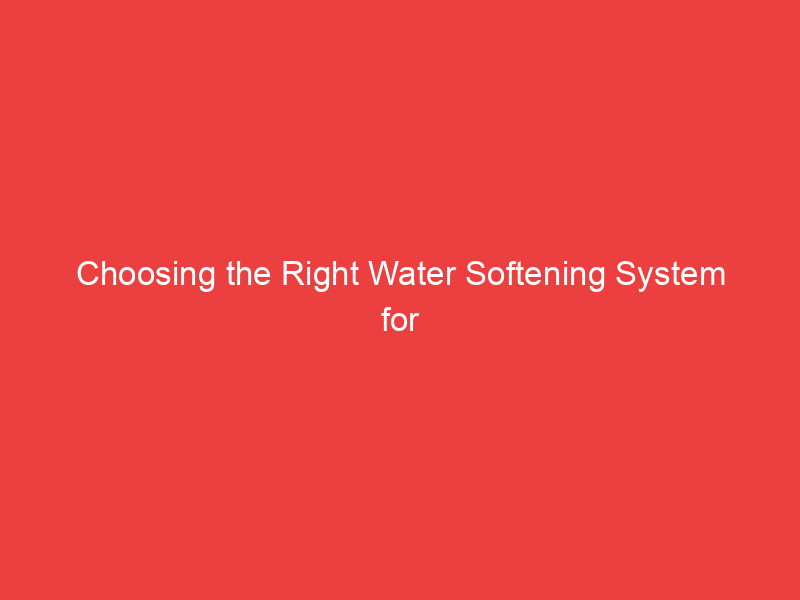Choosing the Right Water Softening System for Tucson: A Guide to Manufacturing and Installation
Water hardness is a common issue faced by many homeowners in Tucson, Arizona. The high mineral content in the water can lead to various problems such as scaling, reduced efficiency of appliances, and dry skin and hair. To combat these issues, investing in a water softening system is essential.
This guide aims to provide you with valuable information on understanding water hardness in Tucson, key factors to consider when selecting a water softening system, and the importance of professional installation for ensuring efficiency and longevity of your chosen system.
Understanding Water Hardness in Tucson
Before diving into the process of choosing a water softening system, it is important to understand what water hardness is and how it impacts your daily life. Water hardness refers to the mineral content, primarily calcium and magnesium, present in water. These minerals can accumulate and form limescale deposits in pipes, appliances, and fixtures, leading to reduced efficiency and potential damage over time.
The hardness of water is measured in grains per gallon (GPG) or parts per million (PPM). In Tucson, the water hardness can vary, with the typical range being between 12 to 15 GPG. Anything noting that anything above 10 GPG is considered hard water, and a water softening system is typically recommended to alleviate any associated problems.
Key Factors to Consider when Selecting a Water Softening System
Choosing the right water softening system for your home in Tucson requires careful consideration of various factors. Here are some key factors to keep in mind to ensure you make an informed decision:
Water Softening Technology: There are different types of water softening technologies available, such as ion exchange, salt-free, and magnetic systems. Each technology has its own pros and cons, so it’s important to research and understand the benefits and limitations of each before making a choice.
Capacity and Efficiency: Consider the size of your household and the water demand to select a system with the appropriate capacity. Additionally, look for systems that are energy-efficient and can effectively remove hardness minerals, ensuring the longevity of the system.
Regeneration Process: If you opt for an ion exchange system, consider the regeneration process. Some systems automatically regenerate based on the water usage, while others require manual intervention. It’s important to choose a system that aligns with your preferences and lifestyle.
Maintenance and Operating Costs: Take into account the maintenance requirements and operating costs associated with the water softening system. Consider the cost of salt or other required chemicals, filter replacements, and any additional expenses in the long run.
Space Availability: Evaluate the available space in your home for installing a water softening system. Some systems may require specific configurations or additional equipment, so it’s important to choose a system that fits your space requirements.
Certifications and Warranties: Look for water softening systems that are certified by reputable organizations and come with warranties. These certifications ensure the system meets industry standards, and warranties provide protection against any potential defects or issues.
Professional Installation: Ensuring Efficiency and Longevity
While it may be tempting to attempt a DIY installation to save on costs, opting for professional installation of your water softening system is highly recommended. There are several reasons why professional installation is important:
Expertise and Experience: Professional installers have the expertise and experience to properly install the water softening system, ensuring it functions efficiently and effectively. They understand the complexities involved and can handle any potential challenges that may arise during the installation process.
Proper Equipment and Tools: Professional installers come equipped with the necessary tools and equipment to install the system correctly. They have access to specialized tools and techniques that ensure a seamless installation, minimizing the risk of any damage to the system or your property.
Code Compliance: Professional installers are well-versed in local plumbing codes and regulations. By utilizing their services, you can rest assured that your water softening system installation will meet all the necessary requirements, ensuring safety and compliance.
System Optimization: Professional installers can optimize the system’s performance based on your specific needs and water conditions. They can customize the settings and make the necessary adjustments to ensure optimal efficiency and longevity of the system.
Post-Installation Support: In case of any issues or concerns post-installation, professional installers can provide ongoing support and assistance. Having a reliable and knowledgeable contact for any future maintenance or repair needs is invaluable.
By choosing professional installation, you can save time, eliminate the stress of installation, and have peace of mind knowing that experts have taken care of the process for you.
In conclusion, selecting the right water softening system for your home in Tucson is crucial for addressing the challenges posed by hard water. Consider factors such as technology, capacity, efficiency, maintenance costs, and space availability before deciding. Additionally, opt for professional installation to ensure the proper functioning and longevity of your chosen system. With the right water softening system and expert installation, you can enjoy the benefits of soft, high-quality water in your Tucson home.
When it comes to your water softening needs, consulting with professionals in the field is always a wise decision.

